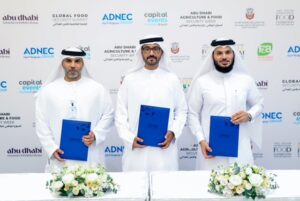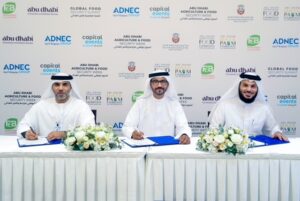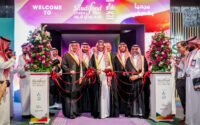Under The Patronage Of Mansour Bin Zayed Launch Of The First Edition Of The “World Food Security Summit” In Conjunction With Abu Dhabi Agriculture And Food Security Week Next November To Showcase Innovative Solutions To End Hunger
Under the patronage of His Highness Sheikh Mansour bin Zayed Al Nahyan, Vice President of the UAE, Deputy Prime Minister, Chairman of the Presidential Court and Chairman of the Board of Directors of the Abu Dhabi Agriculture and Food Safety Authority (ADAFSA), Abu Dhabi will host the World Food Security Summit for the first time at the ADNEC Centre Abu Dhabi on 26 and 27 November. This summit is part of the activities of Abu Dhabi Agriculture and Food Security Week (ADAFSW).
Organised by ADNEC Group, in strategic partnership with ADAFSA, and UAE F&B Manufacturing Group (FBMG) as a knowledge partner, the summit aims to encourage dialogue and practical steps towards building a sustainable global food system and eradicating hunger.
The summit seeks to attract a range of experts and decision-makers to discuss innovative solutions for strengthening the global food security system. This will support international efforts to eliminate hunger and enhance the UAE’s position as a platform for managing dialogues, discussions, and initiatives in global food security. The World Food Security Summitwill address national, regional, and international issues, providing a platform to exchange best practices and innovations in the food security sector.
Commenting on the launch, His Excellency Saeed Al Bahri Salem Al Ameri, Director-General of ADAFSA, said: “Food security is a major global challenge requiring the combined efforts and cooperation of all stakeholders worldwide to find innovative solutions to end hunger, a key UN Sustainable Development Goal.
Over the past decades, the UAE and the Emirate of Abu Dhabi have played a pioneering role in promoting sustainable food systems, inspired by the legacy of the late Sheikh Zayed bin Sultan Al Nahyan, the UAE’s founder, and guided by the vision and directives of His Highness Sheikh Mohamed bin Zayed Al Nahyan, President of the UAE.”
Al Ameri continued: “The summit will bring together a distinguished group of the world’s leading food security experts, alongside officials from both public and private sectors, and civil society leaders, to discuss ways of bolstering food security. Our aim is to engage all stakeholders worldwide, particularly those from developing countries, as well as women and youth representatives, to share experiences, knowledge, and ideas through this summit.
We will also showcase the UAE and Abu Dhabi’s exceptional achievements in enhancing food security.” He explained that the generous support and patronage of His Highness Sheikh Mansour bin Zayed Al Nahyan, Vice President of the UAE, Deputy Prime Minister, Chairman of the Presidential Court and Chairman of the Board of Directors of ADAFSA, for the World Food Security Summit reaffirms our commitment to supporting global efforts to achieve food security and our steadfast belief that collective action is the only way to create a better world for all, ensuring that everyone has access to sufficient and nutritious food in a sustainable manner.
His Excellency Humaid Matar Al Dhaheri, Managing Director and Group CEO of ADNEC Group, said: “Organising the summit aligns with ADNEC Group’s strategy to support all national endeavours aimed at advancing the current and future state of the food security sector. This sector is one of the most crucial pillars of the emirate’s sustainable economic development plans, which are in line with the wise leadership’s vision for the next fifty years. Through this, we aim to create a global platform that attracts experts and specialists from across the globe to contribute to transferring and localising advanced technologies within the country. This will further solidify Abu Dhabi’s position as a hub for creativity and innovation in these vital sectors.”
Al Dhaheri added: “The summit’s strategic importance is amplified by its timing alongside ADIFE and the ADDPE, both of which are organised by ADNEC Group. Together, they form a comprehensive system that showcases the latest innovations and technologies in the sector. They also facilitate the establishment of strategic partnerships between major global and local companies, and attract a constellation of experts and specialists from around the world. This ultimately contributes to the UAE’s efforts to take a leading role in this vital sector on a global scale.”
He emphasised that the group’s working teams will collaborate with their partners in both the public and private sectors to ensure the success of these important events. They will be presented in a manner that befits Abu Dhabi’s reputation and standing on both regional and international stages, utilising all available resources according to the highest global standards in the sector.
Saleh Lootah, Chairman of FBMG, expressed his pride in the strategic partnership with ADAFSA and ADNEC Group to organise the inaugural World Food Security Summit, which will take place over two days in conjunction with ADAFSW.
He added that the summit will include several themes and discussion sessions that will attract a select group of government officials, decision-makers, experts, and specialists from around the world to discuss the most prominent challenges facing this vital sector and find innovative solutions that contribute to reducing hunger.
The first edition of the World Food Security Summit will be incorporated into ADAFSW activities. This coincides with the third edition of ADIFE 2024 and the tenth edition of ADDPE 2024. These events are organised by Capital Events, the event organising arm of ADNEC Group. Record participation from major global companies specialising in these vital sectors is anticipated, alongside the launch of several new accompanying events.
It’s worth noting that the UAE reaffirmed its commitment to bolstering food security during last year’s (2023) Conference of the Parties to the United Nations Framework Convention on Climate Change (COP 28), which the country hosted. For the first time ever, food systems were placed at the forefront of the summit’s agenda. The COP 28 declaration in the UAE regarding sustainable agriculture, resilient food systems, and climate action represents a landmark achievement in global efforts to encourage nations to prioritise the right to adequate food within their national food security strategies. This ensures everyone has access to safe, sufficient, and nutritious food at affordable prices.
According to estimates from relevant international organisations, over 783 million people worldwide, or nearly 10% of the global population, suffer from chronic hunger. This situation is worsening due to the escalating food insecurity crisis. More than 258 million people in 58 countries face acute food shortages, and experts warn of serious risks threatening an additional 130 million people with falling into the trap of acute hunger in the near future.
The Global Food Security Index (GFSI) shows that the crisis is likely to intensify, with food affordability declining by 4% between 2019 and 2022. This decline is attributed to several factors, most notably the COVID-19 pandemic, which disrupted supply chains and led to rising food prices. Additionally, increased production input costs, such as seeds and fertilisers, and geopolitical challenges like conflicts and wars in some regions, contribute to the problem.
The World Food Security Summit in Abu Dhabi is anticipated to attract a wide range of stakeholders from across the food system. This global summit, the largest of its kind, aims to strengthen cooperation between governments, the private sector, institutions, and multilateral organisations. By addressing food security challenges and identifying innovative solutions, the summit will solidify the UAE’s position as a global hub for dialogue and food security solutions.
The activities and strategic partnerships associated with the World Food Security Summit in Abu Dhabi will elevate the city’s status as a leading global destination for facilitating and innovating food security solutions. Ahead of the summit, ADAFSA will organise a series of events and initiatives within the UAE. These initiatives aim to encourage participation from government and private sectors, civil society organisations, and various community groups, further enhancing the country’s strong track record in food security.
A prominent example of this is the National Food Security Strategy 2051. This strategy aims to make the UAE the global leader in GFSI by 2051. It will achieve this through the development of a comprehensive national system based on enabling sustainable food production using advanced technologies, enhancing local production, global partnerships to diversify food sources, and other means.
Similarly, the recently launched AgriFood Growth and Water Abundance (AGWA) in Abu Dhabi acts as a comprehensive economic complex. It reinforces global efforts aimed at ensuring food and water security while innovatively addressing the global challenges of food scarcity and water shortages. The complex is projected to contribute approximately AED 90 billion to Abu Dhabi’s GDP and attract investments of up to AED 128 billion by 2045.
Strategic food security initiatives also include “Ne’ma”, a national initiative to reduce food waste and loss launched by His Highness Sheikh Mohamed bin Zayed Al Nahyan, President of the UAE (May Allah protect him), aimed at promoting responsible and sustainable consumption, reinforcing values and traditions related to social responsibility and effective management of national resources.
In addition, ADAFSA has developed an integrated strategy to achieve global leadership in food security, including restructuring the agricultural sector to enhance sustainability, reduce environmental impacts and pressure on natural resources, ensure fair income for farmers, enhance their competitiveness in the market, focusing on products where Abu Dhabi has a competitive advantage, improving the quality of agricultural products, and boosting national productivity to achieve the highest levels of food security.
To achieve these targets, the authority has launched several supportive initiatives for both the plant and animal agricultural sectors, encouraging the use of modern agricultural technologies such as hydroponics and vertical farming to increase productivity, promoting investment in the agricultural sector by providing incentives to investors and attracting capital, along with providing a wide range of services to build the capacities of sector workers, develop infrastructure, raise awareness of the importance of food security through consumer-focused awareness and education programmes, and the campaign to reduce food waste and loss.








